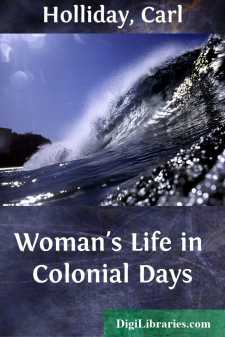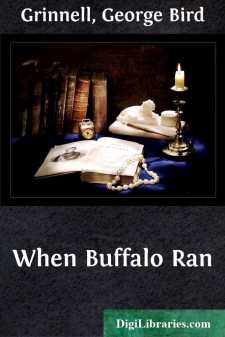History
- Africa 30
- Americas (North Central South West Indies) 50
- Ancient 68
- Asia 58
- Australia & New Zealand 8
- Canada 41
- Caribbean & West Indies 1
- Civilization 20
- Eastern Europe 12
- Europe 310
- Expeditions & Discoveries 60
- General 77
- Historical Geography 1
- Jewish 9
- Latin America 3
- Medieval 8
- Middle East 13
- Military 248
- Revolutionary 8
- Study & Teaching 5
- United States
- Western Europe 56
- World 13
United States Books
Sort by:
by:
Montague Glass
POTASH AND PERLMUTTER DISCUSS THE CZAR BUSINESS Like the human-hair business and the green-goods business it is not what it used to be. "Yes, Abe," Morris Perlmutter said to his partner, Abe Potash, as they sat in their office one morning in September, "the English language is practically a brand-new article since the time when I used to went to night school. In them days when a feller says...
more...
by:
Carl Holliday
CHAPTER I I. The Spirit of Woman With what a valiant and unyielding spirit our forefathers met the unspeakable hardships of the first days of American colonization! We of these softer and more abundant times can never quite comprehend what distress, what positive suffering those bold souls of the seventeenth century endured to establish a new people among the nations of the world. The very voyage from...
more...
The Plains Country. Seventy years ago, when some of the events here recounted took place, Indians were Indians, and the plains were the plains indeed. Those plains stretched out in limitless rolling swells of prairie until they met the blue sky that on every hand bent down to touch them. In spring brightly green, and spangled with wild flowers, by midsummer this prairie had grown sere and yellow....
more...
CHAPTER I OPPOSING CLAIMS International disputes that end in war are not generally questions of absolute right and wrong. They may quite as well be questions of opposing rights. But, when there are rights on both sides; it is usually found that the side which takes the initiative is moved by its national desires as well as by its claims of right. This could hardly be better exemplified than by the...
more...
A BRIEF SKETCHOF THELIFE AND CHARACTER OF DAVID WALKER. It is generally the desire of the reader of any intellectual production, to know something of the character and the life of the author. The character of David Walker is indicated in his writings. In regard to his life, but a few materials can be gathered; but what is known of him, furnishes proof to the opinion which the friends of man have...
more...
by:
Arnold Bennett
THE FIRST NIGHT I sat with a melting ice on my plate, and my gaze on a very distant swinging door, through which came and went every figure except the familiar figure I desired. The figure of a woman came. She wore a pale-blue dress and a white apron and cap, and carried a dish in uplifted hands, with the gesture of an acolyte. On the bib of the apron were two red marks, and as she approached,...
more...
by:
Selig Perlman
CHAPTER 1 (1) Early Beginnings, to 1827 The customary chronology records the first American labor strike in 1741. In that year the New York bakers went out on strike. A closer analysis discloses, however, that this outbreak was a protest of master bakers against a municipal regulation of the price of bread, not a wage earners' strike against employers. The earliest genuine labor strike in America...
more...
INTRODUCTION. For three reasons, one purely personal (as you will soon see), I am pleased to play even a small part in the reprinting of D. Augustus Dickert's The History of Kershaw's Brigade ... an undertaking in my judgment long, long, overdue. First, it is a very rare and valuable book. Privately published by Dickert's friend and neighbor, Elbert H. Aull, owner-editor of the...
more...
The Old South Read Before the Lexington Chapter U.D.C., February 14, 1909,By Eugenia Dunlap Potts, Historian. No pen or brush can picture life in the old Southern States in the ante-bellum days. The period comprehends two hundred and fifty years of history without a parallel. A separate and distinct civilization was there represented, the like of which can never be reproduced. Socially, intellectually,...
more...
INTRODUCTION (The Planting of the First Colonies) After the discoverers and explorers of the sixteenth century came (chiefly in the seventeenth) the founders of settlements that grew into States—French Huguenots in Florida and Carolina; Spaniards in St. Augustine; English Protestants in Virginia and Massachusetts; Dutch and English in New York; Swedes in New Jersey and Delaware; Catholic English in...
more...











